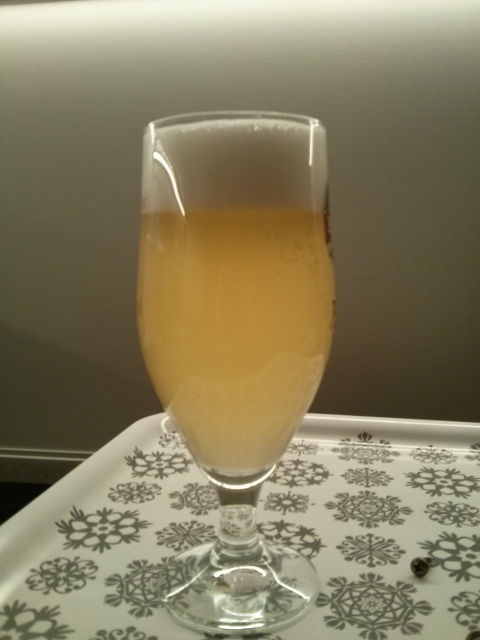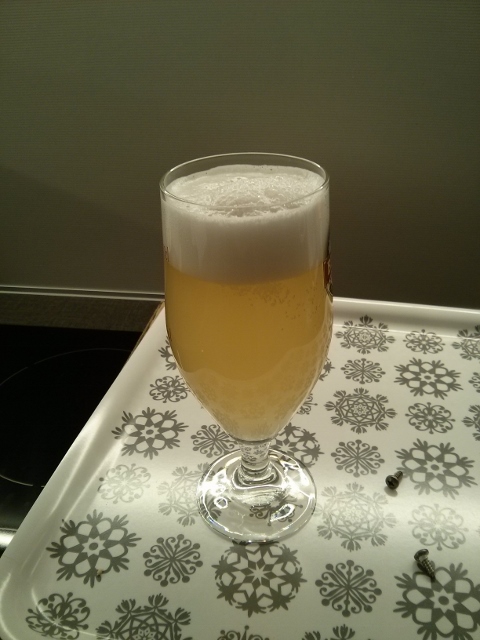del
Member
Here's a short write-up of an expirement I did to see if you can make a 100 % wheat beer with 50 % wheat flour. Short answer: yes! Details follow.
Since I'm in Sweden, I work in metric units. As a service to those loyal to King George, I've also translated it to British Empire Units
Recipe
Batch size: 10 l / 2.65 gal.
Boil size: 13.7 l / 3.62 gal.
Boil time: 45 min.
OG / FG / ABV: 1.043 / 1.010 / 4.7 %.
Bitterness: 10-11 IBU.
Grain bill
900 g / 2 lbs. wheat malt
900 g / 2 lbs. wheat flour (cake flour)
I did this BIAB, it might be necessary to add rice hulls for traditional AG setups.
Single infusion mash at 65-66 °C / 149-151 °F for 60 min. Initial water amount was 13.7 l / 3.62 gal. and only a negligible amount was absorbed by the grain.
Hops
5 g / 0.18 oz Fuggles (45 min)
5 g / 0.18 oz Cascade (15 min)
Boiled for 45 minutes with Fuggles for bittering and a small amount of Cascade for aroma. This should give 10-11 IBU.
After boiling, I poured the full amount into a plastic fermenter and let it cool over night. The next morning, the amount was measured to roughly 10.5 l / 2.77 gal. OG was 1.043.
To start the fermentation off, I scooped about 500 ml / 0.5 quarts of fermenting beer from a Belgian tripel I had going. The yeast strain is Wyeast 1214 (Belgian Ale). Due to lacking temperature control facilities, the fermentation was left to its own devices in a room with an ambient temperature of roughly 22 °C / 71 °F, i.e. quite warm.
Primary fermentation was done after 4 days, FG 1.010. This gives an estimated ABV of 4.7 %.
I bottled this with priming sugar for about 2.7 volumes on day 6. Today was day 19, meaning that it's had 13 days on bottle. At bottling time, there was a massive amount of trub, I had to leave around 1.5 l of 10.5 l behind, which is 0.6 gal. out of 2.77 gal., or a loss of 14 % to trub, which had a thick porridge structure, due to containing all the flour used in the recipe.
How does it taste?
Yes, how indeed? Well, not bad actually. It has a pretty thick head with fine bubbles, a nice pale colour and very solid haze. It looks like witbier. When I poured the glass, a smell of leavened bread dough rose up, it smelled just like when I make pizza dough. Sniffing the beer gives bread dough and banana. The body of this beer is very light, and flavour has a slightly sour flavour like most wheat beers do, as well as a taste of bread dough. There's some fruit and banana, but subtle. There's also a very slight hop flavour in there. It's a very easy drinker, and refreshing. If I had a lawn, I'd be inclined to call it a lawnmower beer.
Would you do it again?
Probably not exactly like this. While nice, I think a little bit more malt would've been nice, so I'd probably make this again with 20 % barley or so.
Would I use wheat flour again? Yes, definitely. I'm really liking this bready flavour, and you sure can't beat wheat flour for price!
All in all, I think this was a fun experiment that turned out much better than expected. I'm keen to see how this beer developes over the next few weeks, as it's still quite young.
Oh, and some pictures:


Since I'm in Sweden, I work in metric units. As a service to those loyal to King George, I've also translated it to British Empire Units
Recipe
Batch size: 10 l / 2.65 gal.
Boil size: 13.7 l / 3.62 gal.
Boil time: 45 min.
OG / FG / ABV: 1.043 / 1.010 / 4.7 %.
Bitterness: 10-11 IBU.
Grain bill
900 g / 2 lbs. wheat malt
900 g / 2 lbs. wheat flour (cake flour)
I did this BIAB, it might be necessary to add rice hulls for traditional AG setups.
Single infusion mash at 65-66 °C / 149-151 °F for 60 min. Initial water amount was 13.7 l / 3.62 gal. and only a negligible amount was absorbed by the grain.
Hops
5 g / 0.18 oz Fuggles (45 min)
5 g / 0.18 oz Cascade (15 min)
Boiled for 45 minutes with Fuggles for bittering and a small amount of Cascade for aroma. This should give 10-11 IBU.
After boiling, I poured the full amount into a plastic fermenter and let it cool over night. The next morning, the amount was measured to roughly 10.5 l / 2.77 gal. OG was 1.043.
To start the fermentation off, I scooped about 500 ml / 0.5 quarts of fermenting beer from a Belgian tripel I had going. The yeast strain is Wyeast 1214 (Belgian Ale). Due to lacking temperature control facilities, the fermentation was left to its own devices in a room with an ambient temperature of roughly 22 °C / 71 °F, i.e. quite warm.
Primary fermentation was done after 4 days, FG 1.010. This gives an estimated ABV of 4.7 %.
I bottled this with priming sugar for about 2.7 volumes on day 6. Today was day 19, meaning that it's had 13 days on bottle. At bottling time, there was a massive amount of trub, I had to leave around 1.5 l of 10.5 l behind, which is 0.6 gal. out of 2.77 gal., or a loss of 14 % to trub, which had a thick porridge structure, due to containing all the flour used in the recipe.
How does it taste?
Yes, how indeed? Well, not bad actually. It has a pretty thick head with fine bubbles, a nice pale colour and very solid haze. It looks like witbier. When I poured the glass, a smell of leavened bread dough rose up, it smelled just like when I make pizza dough. Sniffing the beer gives bread dough and banana. The body of this beer is very light, and flavour has a slightly sour flavour like most wheat beers do, as well as a taste of bread dough. There's some fruit and banana, but subtle. There's also a very slight hop flavour in there. It's a very easy drinker, and refreshing. If I had a lawn, I'd be inclined to call it a lawnmower beer.
Would you do it again?
Probably not exactly like this. While nice, I think a little bit more malt would've been nice, so I'd probably make this again with 20 % barley or so.
Would I use wheat flour again? Yes, definitely. I'm really liking this bready flavour, and you sure can't beat wheat flour for price!
All in all, I think this was a fun experiment that turned out much better than expected. I'm keen to see how this beer developes over the next few weeks, as it's still quite young.
Oh, and some pictures:




